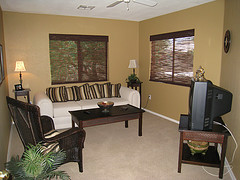How to Choose a Facility: 8 Things to Consider
1. Location, Location, Location
The real-estate cliché holds true when it comes to senior living choices. If you live in the same area as your parents, you will obviously want to look for facilities that are a short-drive away. Keep in mind that if your parent’s health deteriorates, you will place a premium on being as close to the center as possible. Driving 45 minutes to check on a parent who feels dizzy is not a lot of fun. You will also want to look for a location that is close to medical services, groceries, etc. Being relatively close to a hospital can be lifesaving in the event of a heart attack or stroke.

Courtesy: Flickr's athomeinscottsdale
If the prospective resident drives, you should look for a home that is easy to access from the local roads. You don’t want an aging parent to be making left turns onto busy byways. You can search for assisted living facilities within a certain distance of a zip code by using our search function. If the prospective resident doesn’t drive, you will want to look for a facility that offers transportation services.
2. Privacy
Many seniors are wary of assisted living centers because they will miss the privacy of their homes. When selecting a facility, your parent may value multiple entrances and a staff that respect the privacy of the residents. It is tough to balance privacy and safety, the key is respect. Do staff members knock before entering, or do they just barge right in? Consider the privacy of potential apartments when choosing your parent’s unit. Of course, if your parent requires more care, you’ll want to look for a facility that can meet their needs with minimal infringement on their privacy and dignity.
3. Socialization
One of the benefits of assisted living homes is that they facilitate social interaction among residents. Ask about programs and events available for residents. Many centers offer exercise classes, religious services, games times, and much more. Seniors enjoy a game of Wii bowling as much as everyone else! Also, make sure to eat in the dining room to get an idea of how residents interact during meal time.
4. Food
As people age, it becomes more and more burdensome to prepare meals for themselves. Assisted Living Centers provide meals for their residents in a communal setting. Your loved one will be eating a lot of this food, so you’ll want to make sure it is acceptable. When you a tour a facility, ask to eat a meal in the dining room. Don’t hesitate to ask other residents about the quality of the food and the service. They’ll let you know if you’re experience is typical. Make sure to ask about policies regarding meals eaten away from the dining room.
5. Level of Care
As discussed in an early article, “assisted living” means different things to different people and varies from state to state. You’ll want to make sure that the facility you choose can meet the current and future needs of your parent or loved one whether they’re incontinence or assistance dressing. Some facilities offer a range of services that approach those of a nursing home while others aren’t much more than monitored apartments. It’s crucial to determine whether the facility can provide the level of care needed today and in the near future.
6. Policies
Are pets allowed? How about smoking? Make sure to read the fine print and ask the same type of questions you would want to know if you were considering a new apartment.
7. Cost
The price of assisted living care can vary widely from facility to facility. Don’t be bashful to ask about fees. Most facilities charge based on the level of care. Make sure you understand how much costs will increase if your loved one requires additional care in the future. You can learn more about cost in the article: How much does assisted living cost?
8. Reputation. Most states inspect assisted living centers on a regular basis and in response to complaints. Many of these states post their reports online. Review these reports to find a facility with a good track record.
